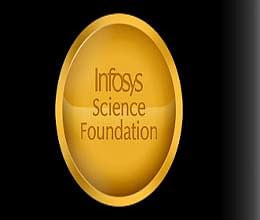
The Infosys Science Foundation Thursday honoured seven winners of the Infosys Prize 2012 across six categories spanning science and humanities at a simple ceremony here.
At the ceremony, coinciding with the centenary celebrations of the Indian Science Congress in Kolkata, former Norway premier Gro Harlem Brundtland felicitated the seven laureates, selected by an eminent jury from 220 nominees in diverse subjects such as engineering and computer science, life sciences, physical sciences, social sciences, mathematics and humanities.
Brundtland said progress in science and research was directly linked to economic and social development of a country.
"Scientific progress in medicine has helped the life expectancy in India to double over the last 50 years. Scientists also heralded the advances in electricity and chemistry in the nineteenth century to drive the second industrial revolution," said Brundtland, who is also a former World Health Organisation director-general.
The Infosys Prize in each category comprises a gold medallion, a citation expounding the laureate's work and Rs.50 lakh (Rs.5 million/$90,000).
The prize money for the inaugural humanities category was split equally between two winners -- Sanjay Subrahmanyam, distinguished history professor at the University of California at Los Angeles, and Amit Chaudhuri, contemporary literature professor at University of East Anglia, Norwich (Britain).
"The pioneering work undertaken by the seven laureates is changing the game in their respective spheres," said Infosys executive co-chairman and foundation's board of trustees president S. Gopalakrishnan on the occasion.
The winners were Ashish Lele, scientist at National Chemical Laboratories in Pune for engineering and computer science; Satyajit Mayor, professor of cellular organisation and signalling at the National Centre for Biological Sciences in Bangalore for life sciences; Manjul Bhargava, mathematics professor at Princeton University (US) for mathematical sciences; Ayyappanpillai Ajayaghosh, senior scientist at the National Institute for Interdisciplinary Science and Technology at Thiruvananthapuram for physical sciences and Arunava Sen, professor, economics and planning unit at the Indian Statistical Institute in New Delhi for social sciences.
"In the fourth year of the Prize, the Foundation continues to make steady progress in bringing science and humanities to the mainstream by recognising some of the finest researchers for their unparalleled achievements," Gopalakrishnan noted.
The jury chairs for each category were Nobel Laureate Amartya Sen (humanities), Kaushik Basu (social sciences), Shrinivas Kulkarni (social sciences), Pradeep K. Kholsa (engineering & computer science), Srinivasa S.R. Varadhan (mathematics) and Inder Verma (life sciences).
"We hope that the work of our laureates will inspire the young generation to take up science and research and be creators of the change that they want to see in the India of tomorrow," Gopalakrishnan added.
Planning Commission deputy chairman Montek Singh Ahluwalia, plan panel member Arun Maira, Unique Identification Authority of India chairman Nandan Nilekani, Confederation of Indian Industry (CII) former chief mentor Tarun Das and Nasscom president Som Mittal were also present on the occasion.
At the ceremony, coinciding with the centenary celebrations of the Indian Science Congress in Kolkata, former Norway premier Gro Harlem Brundtland felicitated the seven laureates, selected by an eminent jury from 220 nominees in diverse subjects such as engineering and computer science, life sciences, physical sciences, social sciences, mathematics and humanities.
Brundtland said progress in science and research was directly linked to economic and social development of a country.
"Scientific progress in medicine has helped the life expectancy in India to double over the last 50 years. Scientists also heralded the advances in electricity and chemistry in the nineteenth century to drive the second industrial revolution," said Brundtland, who is also a former World Health Organisation director-general.
The Infosys Prize in each category comprises a gold medallion, a citation expounding the laureate's work and Rs.50 lakh (Rs.5 million/$90,000).
The prize money for the inaugural humanities category was split equally between two winners -- Sanjay Subrahmanyam, distinguished history professor at the University of California at Los Angeles, and Amit Chaudhuri, contemporary literature professor at University of East Anglia, Norwich (Britain).
"The pioneering work undertaken by the seven laureates is changing the game in their respective spheres," said Infosys executive co-chairman and foundation's board of trustees president S. Gopalakrishnan on the occasion.
The winners were Ashish Lele, scientist at National Chemical Laboratories in Pune for engineering and computer science; Satyajit Mayor, professor of cellular organisation and signalling at the National Centre for Biological Sciences in Bangalore for life sciences; Manjul Bhargava, mathematics professor at Princeton University (US) for mathematical sciences; Ayyappanpillai Ajayaghosh, senior scientist at the National Institute for Interdisciplinary Science and Technology at Thiruvananthapuram for physical sciences and Arunava Sen, professor, economics and planning unit at the Indian Statistical Institute in New Delhi for social sciences.
"In the fourth year of the Prize, the Foundation continues to make steady progress in bringing science and humanities to the mainstream by recognising some of the finest researchers for their unparalleled achievements," Gopalakrishnan noted.
The jury chairs for each category were Nobel Laureate Amartya Sen (humanities), Kaushik Basu (social sciences), Shrinivas Kulkarni (social sciences), Pradeep K. Kholsa (engineering & computer science), Srinivasa S.R. Varadhan (mathematics) and Inder Verma (life sciences).
"We hope that the work of our laureates will inspire the young generation to take up science and research and be creators of the change that they want to see in the India of tomorrow," Gopalakrishnan added.
Planning Commission deputy chairman Montek Singh Ahluwalia, plan panel member Arun Maira, Unique Identification Authority of India chairman Nandan Nilekani, Confederation of Indian Industry (CII) former chief mentor Tarun Das and Nasscom president Som Mittal were also present on the occasion.








